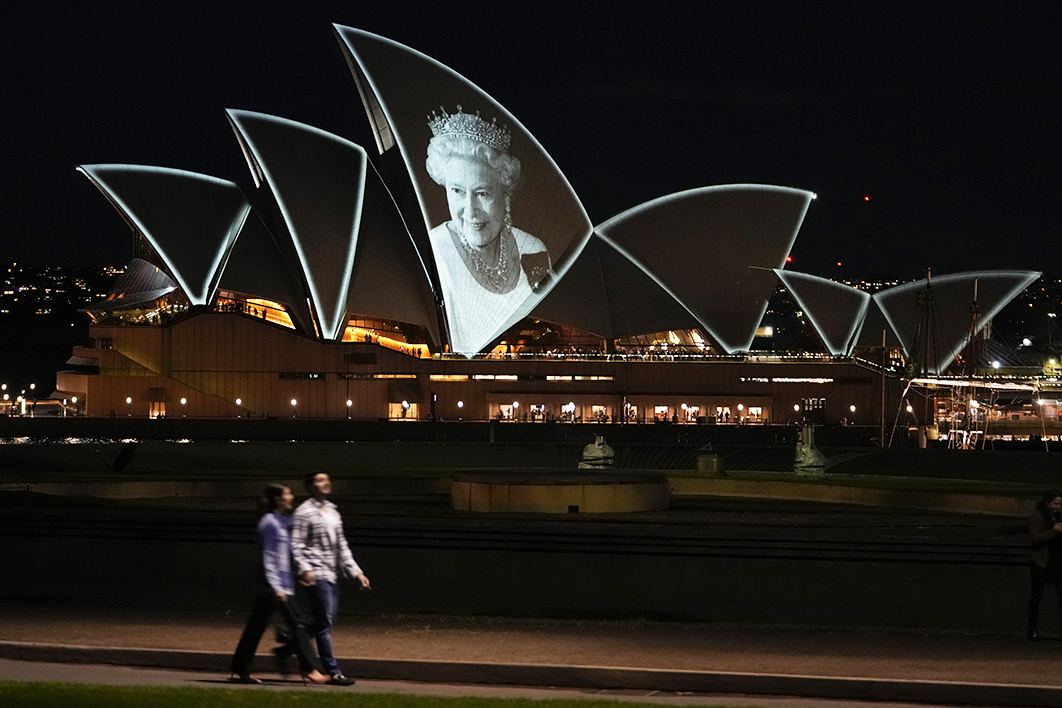It seems almost indecent to add to the barrage of words accompanying the death of Queen Elizabeth II. The rise of twenty-four-hour television news and the reach of the internet mean we can now follow the progress of her casket through the United Kingdom, marvelling at a society that through one side of its mouth proclaims itself free and democratic but through the other tells the handful of dissenters issuing mild protest via word or placard that “you’re nicked, son.”
What does all of this mean for Australia? Possibly not much. Nothing seriously resembling national grief has prevailed, whatever the politicians and media are telling us. The passing of a woman who has simply been there throughout the lives of most of us has a certain poignancy, and she commands respect for being good at her job and being willing to do it to the best of her ability to the very end — which quite reasonably translates into “devotion to duty” in the seemingly endless tributes.
Media companies have been on the lookout for anyone who has ever found themselves in the general vicinity of Her Majesty so I might as well share my experience. I did but see her passing by just once. It was the centenary of the office of Australian high commissioner to the United Kingdom in 2010 — what could very loosely if not quite accurately have been called the centenary of British–Australian diplomatic relations — and I was at a function in Australia House in the Strand, which was also the occasion for the launch of a book I had helped edit.
The royal couple sat on the stage of the grand Exhibition Hall during the formalities and then made their way around the room, the Queen politely formal in the usual way, Prince Philip more chatty. Their progress complete, they took their leave — I suppose they were there an hour — and it was hard not to admire two elderly people who had performed duties of such formidable dullness for much of their lives. And here they were still at it long after most people were enjoying their retirement.
They lived lives of great privilege, of course, and it is right — in an age when the descendants of those oppressed by the British Empire draw attention to that legacy — that her reign should be seen as entangled in a messy, difficult and often brutal imperial history. Elizabeth II’s life began when that empire was at its greatest extent, and the early part of her reign coincided with some of its most appalling violence. It would be a remarkable act of erasure — and a highly political one — to pretend that the only thing that matters in her career is that she was the kind of woman willing to dance with Ghana’s leader Kwame Nkrumah at a ball in 1961. (But that matters in judgements of her role, too. In the United States of the time, African-American men were still occasionally being lynched for forwardness with white women.)
Older Australians will have memories of royal visits and of Australian Women’s Weekly covers from a time when the Queen herself and the monarchy as an institution did express something important about the country’s national identity. Many — perhaps most — Australians were proud to be British, proud to belong to the Empire and then, when that disappeared, grateful to belong to the Commonwealth, even if only because it gave the country’s athletes a decent show of a solid medal haul.
That pride gradually declined as Britain turned to Europe in the 1960s and 1970s and Australia turned to the United States and Asia. The monarchy itself has come to matter a great deal less to most of us than it did back then. One of the most striking features of the Palace Letters — the correspondence from 1974–77 mainly between Sir John Kerr and Sir Martin Charteris, the Queen’s private secretary, released in 2020 after Jenny Hocking’s High Court victory against the National Archives of Australia — was that they evoked a world in which the monarchy still seemed to matter.
Kerr took seriously the idea that the monarch’s place in Australian life could be protected and even strengthened; it helps explain his outrageous behaviour. Charteris also clearly believed that this battle was still one worth fighting, which might help explain why he so foolishly engaged in discussion with Kerr about the nature of the governor-general’s reserve powers.
It was much more common in my youth to see pictures of the Queen on the walls of public buildings than it is today, and in some subtle way she still seemed to be one of us — not like, say, Olivia Newton-John and Paul Hogan, but not quite a foreigner either. Yet it is still startling to watch footage of old Olympic ceremonies of the late 1960s and early 1970s — in full colour — with Australia’s rare gold medal victories accompanied by “God Save the Queen.”
Royal visits evoked greater excitement in the 1970s — and in the 1980s, too, with the arrival of the young and glamorous Princess Diana — than they did ever after. Writing to the Palace in early 1984, Sir Ninian Stephen, the governor-general of the day, said of republicanism that “even its most optimistic supporters see it as a far-off beacon rather than as any at all immediate goal. It counts for little in practical affairs but is always good material for articles in Sunday papers or for questions in opinion polls.”
Most Australians, if they bothered thinking about such matters at all, continued to see the monarchy as worthy of retaining in their Constitution, even as public opinion shifted toward a sense of its unimportance to them — at least that is what political scientist Luke Mansillo’s research on polling tells us of the 1980s. I can’t recall the last time I was invited to toast the Queen at an event in Australia; was it the evening, at our end-of-school dinner in 1986, when we also toasted Pope John Paul II?
Things did change in the 1990s, with the rise of republicanism in the Keating era. While the nation debated that issue we also, from 1994, ceased to expect new migrants to pledge allegiance to the monarch. The monarchy, especially in light of the family problems of the Windsors, suddenly seemed less relevant to a confident, multicultural, Asian-facing Australian society. Ninian Stephen had distinguished nationalism from republicanism in 1984; by the early 1990s, though, republicanism had become an expression of nationalism for many more Australians. Cultural and political identities were coming into alignment.
The Queen’s death will inevitably make the question of Australia’s becoming a republic more pressing. Some republicans — Malcolm Turnbull has been the most prominent — urged Australians simply to put off the matter until the Queen’s passing. But Turnbull’s attitude to this question belongs to a much longer tradition whereby politicians proclaim the republic inevitable while always finding reasons to put it off until the week after never. Anthony Albanese’s position, at least superficially, looks a bit more promising for republicans. Labor’s priority is constitutional recognition for Indigenous people and the Voice to Parliament. The republic will come after that. Or so we’re told.
My own feeling is that the aftermath of the Queen’s death will provide republicans with little comfort. It is true that the often embarrassing media coverage — which seems rather like I imagine it would be to swim in a pool filled with molasses — will place in the spotlight some of the absurdities of the system, especially for a country such as Australia that likes to imagine itself as independent.
Yet, while monarchy means little to Australians in practical terms, it is still meaningful as celebrity and spectacle. The pageantry around the monarchy will be in full flight in the time ahead. Leaving aside the Queen’s funeral, which will be a grand, solemn and sombre ritual, the coronation of Charles III will follow, presumably in the new year. I doubt that the parlous state of a post-Brexit United Kingdom will do anything to encourage economy or restraint. It is more likely to have the opposite effect, for a cynical and failed British elite has every reason to promote fantasy and escape when the prison of reality is so cold (quite literally for many in the coming winter) and discomforting.
Presumably, an investiture of William as Prince of Wales will also follow before too long — the last was of his father, in 1969. And we’ll no doubt get our own royal visit from the new king in due course, and it will be different — carrying the gravitas of a serving head of state — from those he made as a mere prince and Geelong Grammar old boy. The Prince of Wales and Princess of Wales will also need to tour as the Prince of Wales and Princess of Wales. So it goes.
These occasions will be a joy to many journalists and perhaps to many other Australians, too. For a time they will relish the novelty of a new king with all of the changes that will bring to everything from the heads on our coins to the names of lawsuits. Yet even after this novelty wears off, the old problems for republicans will remain. What will the republic look like? How do we elect its president? They were the rocks on which the ship was wrecked last time, in 1999, and they still loom treacherously.
Almost a quarter of a century on, we trust our politicians even less than we did back then. Overcoming such obstacles will be no less formidable in the post-Elizabethan age. •




